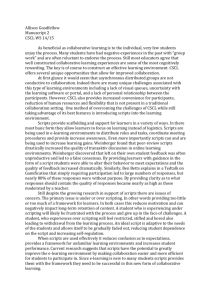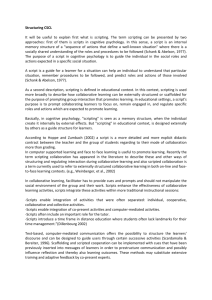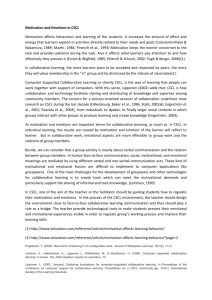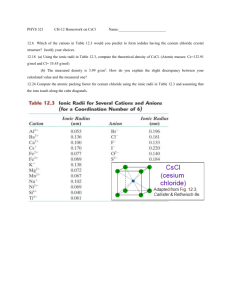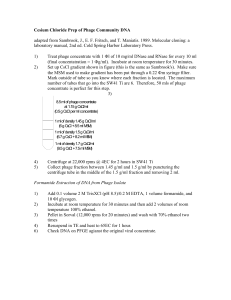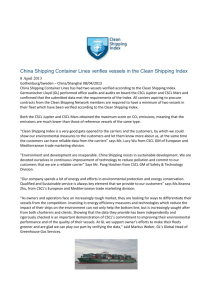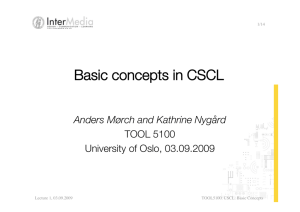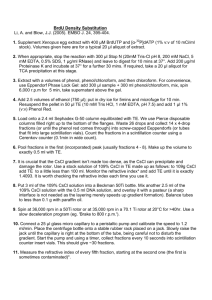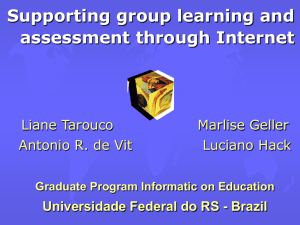Presentation of 2 papers by Jan Are Otnes
advertisement
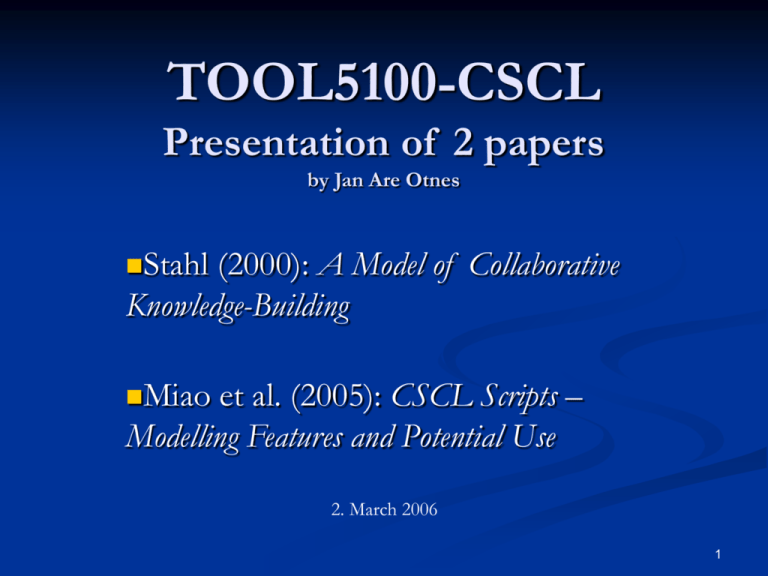
TOOL5100-CSCL Presentation of 2 papers by Jan Are Otnes Stahl (2000): A Model of Collaborative Knowledge-Building Miao et al. (2005): CSCL Scripts – Modelling Features and Potential Use 2. March 2006 1 Stahl (2000): A Model of Collaborative Knowledge-Building Abstract/Introduction A Diagram of Personal and Social KnowledgeBuilding Opportunities for Computer Support The Idea of a Computer System to Support the Knowledge-Building Process Conclusion Stahl (2000): A Model of Collaborative Knowledge-Building 2 Abstract/Introduction The paper present a model of learning as a social process Individual minds in relation to socio-cultural Framework for the design of CSCL-SW (KBE) 5 theories of learning (Koschmann) The paper incorporating insights from these theories/philosophies Multiple phases constitute a cycle => increasingly complex questions to be posed Stahl (2000): A Model of Collaborative Knowledge-Building 3 A Diagram of Personal and Social Knowledge-Building Stahl (2000): A Model of Collaborative Knowledge-Building 4 Opportunities for Computer Support Phase of knowledge building Form of computer support articulate in words articulation editor public statements personal perspective other people's public statements comparison perspective discuss alternatives discussion forum argumentation & rationale argumentation graph clarify meanings glossary discussion shared understanding Glossary negotiate perspectives negotiation support collaborative knowledge group perspective formalize and objectify bibliography discussion cultural artefacts and representations bibliography or other community repository Stahl (2000): A Model of Collaborative Knowledge-Building 5 The Idea of a Computer System to Support the Knowledge-Building Process(1) A KBE should: go beyond a single-purpose system retain a record of the knowledge that was built up And it should therefore probably be: “built on asynchronous, persistent collaborative technologies and be deployed on the Internet as a Web-based environment” Stahl (2000): A Model of Collaborative Knowledge-Building 6 The Idea of a Computer System to Support the Knowledge-Building Process(2) A KBE should: Support several lifecycle phases Help people express their beliefs, discuss them with others, negotiate shared understandings + + + Provide facilities like searching, browsing, filtering +++ Significant difficulties but their potential advantages seem extraordinary! Stahl (2000): A Model of Collaborative Knowledge-Building 7 Conclusion “The process model of knowledge-building presented in this paper provides a conceptual framework for the design, use and assessment of such systems” “KBEs have the potential to provide computationally-supported communication media to facilitate this process that forms a centerpiece of the learning sciences.” Stahl (2000): A Model of Collaborative Knowledge-Building 8 Miao et al. (2005): CSCL Scripts – Modeling Features and Potential Use Introduction Part one Part two Investigating the capacity of IMS LD for formalizing Collaborative Learning Scripts An approach to formalize CSCL Scripts CSCL script authoring tools Potential uses and system support of CSCL scripts Conclusions and future work Miao et al. (2005): CSCL Scripts – Modeling Features and Potential Use 9 Introduction(1) Collaboration script is a set of instructions specifying how the group members should interact and collaborate to solve a problem. O’Donnell & Dansereau(1992) Internal or external representations A CSCL-script is a computational representation of a collaborative script A general modelling language for formalising collaboration scripts is missing. No tool for CSCL practitioners to create, reuse, integrate, and customize CSCL scripts. Miao et al. (2005): CSCL Scripts – Modeling Features and Potential Use 10 Introduction(2) Existing learning process modelling language IMS-LD provides insufficient support to model group-based, synchronous collaborative learning activities. Some attempts have been done to extend IMS-LD, but still no good solutions. The aim for the research work presented in this paper is to develop a scripting language for formalising CSCL scripts and exploring their potential types of usage and system support possibilities Miao et al. (2005): CSCL Scripts – Modeling Features and Potential Use 11 Investigating the capacity of IMS LD for formalizing Collaborative Learning Scripts Maze script, strategies how to escape Major difficulties and challenges in modelling: Groups Artefacts Dynamic features Complicated control flow Varied forms of social interaction Miao et al. (2005): CSCL Scripts – Modeling Features and Potential Use 12 An approach to formalize CSCL Scripts CSCL Scripting language Miao et al. (2005): CSCL Scripts – Modeling Features and Potential Use 13 An approach to formalize CSCL Scripts Solution Explicitly introducing groups Explicitly introducing artefacts Extending actions and expressions Introducing transitions and routing activities Using activity-centred methods to assign roles Stahl (2000): A Model of Collaborative Knowledge-Building 14 CSCL script authoring tools Miao et al. (2005): CSCL Scripts – Modeling Features and Potential Use 15 Potential uses and system support of CSCL scripts System as Editor/Viewer Syntactical mapping to a visual/conceptual representation Presentation of models in multiple perspective Procedural/Temporal Artefacts Roles Individual/Group Model-based prediction Simulation Static configuration of the learning environment Monitoring of the learning flow Model-based scaffolding Miao et al. (2005): CSCL Scripts – Modeling Features and Potential Use 16 Conclusions and future work Stated five major limitations in IMS LD when formalising CSCL scripts Suggested a scripting language for CSCL based on this, where these limitations are solved Discussed potential usages of CSCL scripts and possibilities of system support Developed two script authoring tools, based on the CSCL scripting language Currently focusing on testing the modelling capacity, real experiments will be conducted Will develop an integrated environment later on. Miao et al. (2005): CSCL Scripts – Modeling Features and Potential Use 17 Questions? 18
